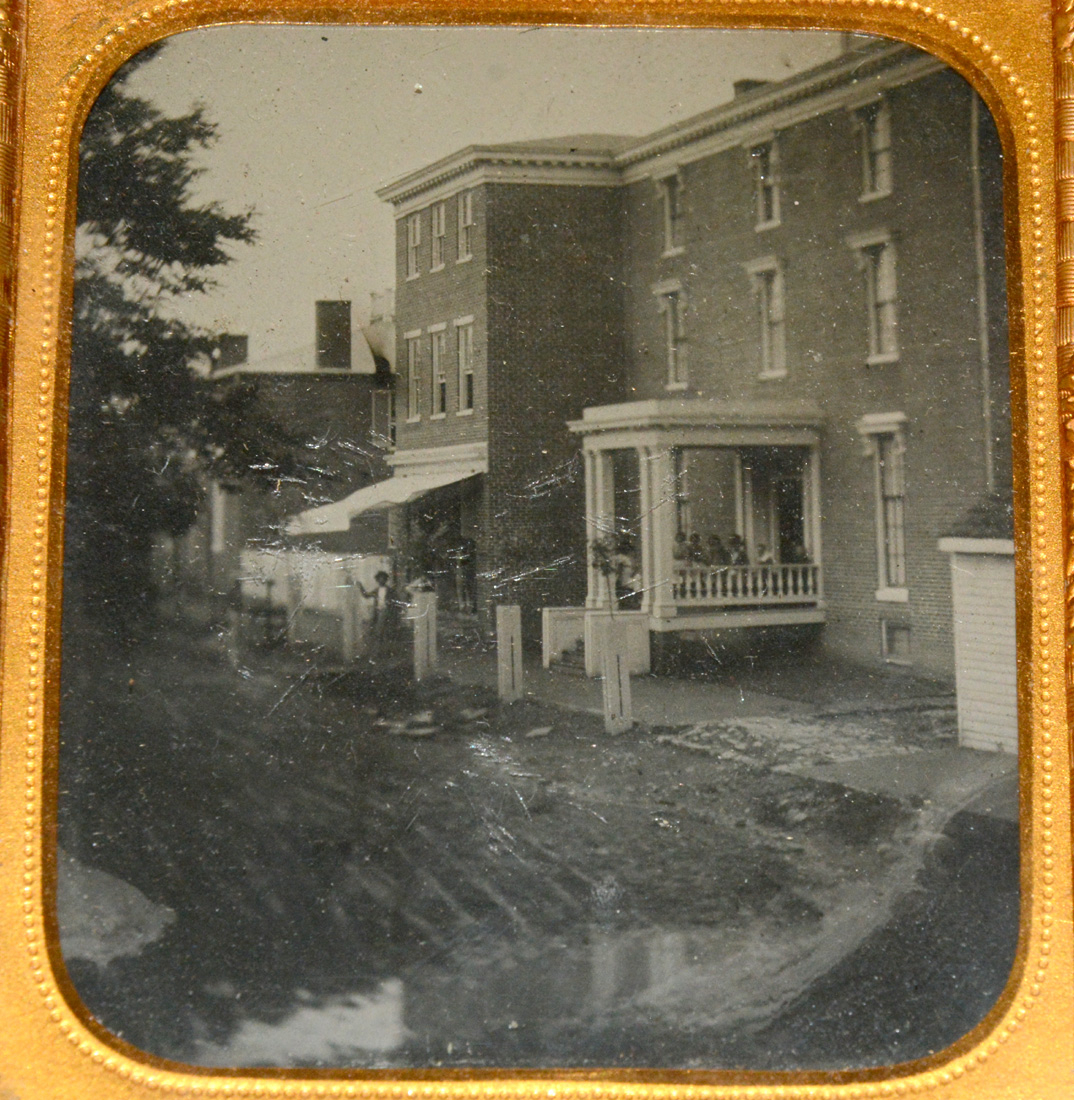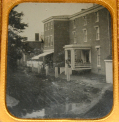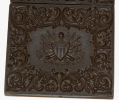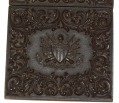site search
online catalog
SIXTH-PLATE OUTDOOR TINTYPE OF THE MCMECHEN HOUSE AND STORE IN MOOREFIELD, WEST VIRGINIA

$1,750.00 SOLD
Quantity Available: None
Item Code: 1138-1805
Great outdoor view of the McMechen house and store on Main St. in Moorefield, West Virginia. The house and store fill the right side of the image with another home visible in the background. The left side of the view is taken up by a tree and muddy street complete with visible wheel ruts. The house and store are a large brick structure with the house having a small square porch while the storefront is covered by an awning. Note there are a number of African-American servants visible on the front porch.
Clarity and contrast are excellent. Plate is clean.
Image comes housed in a union case with a raised scrollwork decoration with a panoply of arms at center. Case is in excellent condition. Plain brass mat and decorative frame are also present.
The hose was recently used as a bed & breakfast but it is now closed. However, their website has provided a short history of the home.
“This house was constructed about 1853 for Samuel A. McMechen, merchant, father of five daughters and deacon of Moorefield Presbyterian Church up the street on your left. The attached McMechen Store, on the left, predates the house. A Confederate sympathizer, McMechen entertained Confederate officers at his house when they controlled Moorefield. When Union forces occupied the town, McMechen left for his cabin at Howard's Lick Spring (presently Lost River State Park) or for friends' homes in the Shenandoah Valley. Presumably he was away when Union Gen. John C. Fremont made his headquarters in the house in May 1862.
Confederate Gen. John McCausland, retreating after the unsuccessful attack on Washington, D.C. and the burning of Chambersburg, Pennsylvania, in 1864, was asleep upstairs when Union Gen. William W. Averell attacked his troops bivouacked four miles north of here about dawn on August 7. McCausland lost hundreds of horses, later hampering Confederate cavalry operations in the Shenandoah Valley.
Moorefield changed hands several times during the war as each side sought control of the Baltimore and Ohio Railroad, or advanced to or retreated from the Shenandoah Valley. Each army foraged for horses, cattle, sheep, hogs, wheat, corn, and dry goods in the countryside and in Moorefield.
Confederate Gen. Fitzhugh Lee reported at the end of 1863 that few supplies could be found here.
At war's end, McMechen repaired his house, restocked his store, and helped the community recover. Resentment lingered, however. His wife, Mary Elizabeth McMechen, remarked in 1866, "We have been torn from Virginia by wicked force, but we are Virginians still." “ [ad][ph:L]
~~~~~~~~~~~~~~~~~~~~~~~~~~~~~~~~~~~
THIS ITEM, AS WITH ALL OTHER ITEMS AVAILABLE ON OUR WEB SITE,
MAY BE PURCHASED THROUGH OUR LAYAWAY PROGRAM.
CLICK HERE FOR OUR POLICIES AND TERMS.
THANK YOU!
Inquire About SIXTH-PLATE OUTDOOR TINTYPE OF THE MCMECHEN HOUSE AND STORE IN MOOREFIELD, WEST VIRGINIA
For inquiries, please email us at [email protected]
Most Popular
Historical Firearms Stolen From The National Civil War Museum In Harrisburg, Pa »
Theft From Gravesite Of Gen. John Reynolds »
Cavalry Carbine Sling Swivel »
Fine Condition Brass Infantry Bugle Insignia »
featured item
OFFICER’S FROCK COAT OF BREVET MAJOR GENERAL JOSEPH K. BARNES, SURGEON GENERAL OF THE U.S. ARMY 1864-1882
This would be the centerpiece of any medical collection: the Major General’s frock coat of Surgeon General Joseph K. Barnes. Barnes was born in Philadelphia in 1817, studied medicine at Harvard, under US Navy Surgeon General Harris, and received… (1179-579). Learn More »







